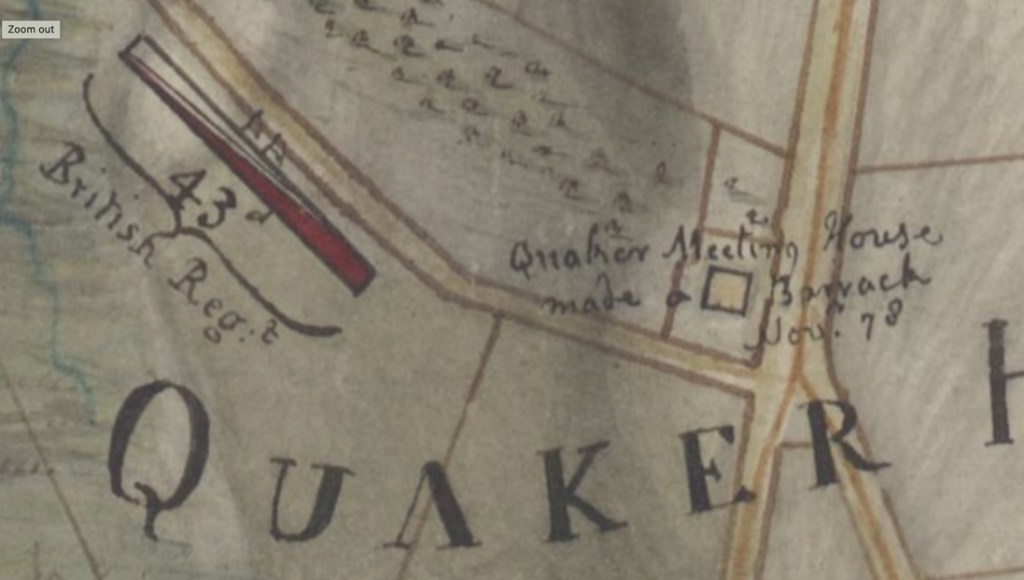Before 9 AM, August 29, 1778
After a skirmish with American Wade’s forces, British General Smith and the 43rd Regiment pushed up Middle Road while the 22nd Regiment proceeded up East Main Road. The diversity of the troop coats created confusion during the fight. British soldiers mistook Continentals with blue coats for Germans with blue coats, so American soldiers got within easy firing range of the Red Coats.
American units (Wiggleworth’s Regiment, Livingston’s advanced guard and Wade’s pickets) were waiting at the junction of Middle Road, East Road and Hedley Street near where the Quaker Meeting House is. American General Sullivan saw his troops retreating, so he sent in Shepard’s Regiment of Massachusetts Continentals. General Sullivan’s “Life Guards” were sent in as well. For a while the Americans had an advantage.
A private from Jackson’s attachment described the action:
“We began to attack. The action began to be warm when we were reinforced by Col. Shepard’s Regiment under the command of Lieutenant Colonel Sprout. The action then commenced hot. We plied them so briskly that they began to give way. Our troops seeing this, gave three cheers and advanced. The enemy then gave way and left one piece of cannon but poorly supported. A party of our men then advanced, drove the artillerymen and took possession of the cannon. The enemy then rallied and being reinforced, advanced and gave our men so heavy a fire that they obliged them to quit their prize, the cannon.”

Diary of a soldier in the RI Expedition (Massachusetts Historical Society. Quoted in McBurney.
Sullivan sent an aide, John Trumbull, to order Wigglesworth to retreat.
“Reminiscences of his own Times” by John Trumbull that describes events on August 29th, 1778. My notes are in bold italics.
“Soon after daybreak the next morning, the rear-guard, commanded by that excellent officer, Colonel Wigglesworth, was attacked on Quaker, otherwise called Windmill Hill {actually it was Butts Hill that was called Windmill Hill} and General Sullivan, wishing to avoid a serious action on that ground, sent me with orders to commanding officer to withdraw the guard. …..
Nothing can be more trying to the nerves, than to advance deliberatively and alone into danger. At first I saw a round shot or two drop near me, and pass bounding on. I met poor Colonel Tousard, who had just lost one arm, blown off by the discharge of a field piece, for the possession of which there was an ardent struggle. He was led off by a small party. Soon after, I saw Captain Walker, of H. Jackson’s regiment, who had received a musket ball through his body, mounted behind a person on horseback. He bid me a melancholy farewell, and died before night. Next, grape shot began to sprinkle around me, and soon after musket balls fell in my path like hailstones. This was not to be borne. I spurred on my horse to the summit of the hill, and found myself in the midst of the melee. ‘Don’t say a word, Trumbull;’ cried the gallant commander, ‘I know your errand, but don’t speak; we will beat them in a moment.’
‘Col. Wigglesworth, do you see those troops crossing obliquely from the west road towards your rear?’
‘Yes, they are Americans, coming to our support.’
‘No sir, those are Germans; mark, their dress is blue and yellow, not buff; they are moving to fell late your rear, and intercept your retreat. Retreat instantly — don’t lose a moment, or you will be cut off.’
The gallant man obeyed, reluctantly, and withdrew the guard in fine style, slowly, but safely.”
The heavy action lasted for almost a hour. Some American writers called it an orderly retreat, but British writers recorded that the Americans retreated at a run. As the British came within range of the six 18 pounders fired from Butts Hill, the British regrouped. From Quaker Hill British General Smith could see the strength of Sullivan’s lines. By 9:30 AM Smith decided against an assault and he withdrew back to the top of Quaker Hill. Almost half the casualties of the battle came from the skirmishes on East Main Road.
Resources:
McBurney’s The Rhode Island Campaign provides an excellent narrative.
Anthony Walker, So Few the Brave. 1981, R.I. Sons of the American Revolution.
“Reminiscences of his own Times” by John Trumbull is quoted in Stone’s Our French Allies.
Leave a comment